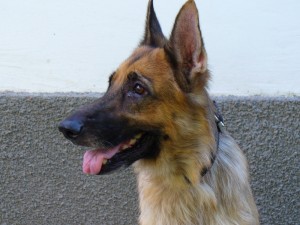The emergency department in a hospital can be a very tense place. Injured people want to be tended to immediately, their family members get upset on their behalf, two people from an altercation can both wind up at the same hospital — there are many reasons why emotions can spill over and difficult situations can develop. And such situations can be stressful and dangerous for nurses as well as patients and their families.
At a hospital in Baltimore, a two-member security team is called when things start to get heated. One member of the team is human, but the other is a German Shepherd. Often just the dog’s presence can serve as a calming influence, according to this article on Nurse.com. The dogs add “another level of authority,” according to the hospital’s clinical director for the ED, and “They have a nice presence.”
The hospital is in a high-risk crime area, and started using a K-9 unit in 1994 to help curb violence on the campus. Administrators think that the dogs’ presence has had a profound effect.
“Our director goes to downtown meetings in Baltimore [with other hospital administrators] and they share crime statistics,” said Mark Ross, captain of Mercy’s K-9 Unit. “It’s well-known within the city that Mercy has dogs and it’s not a place to go for crime.”
Ross and four other handlers have their dogs with them at work and at home. The dogs are imported from Europe and trained for protection and to hunt human and explosive odors. Ross, who has partnered for two years with Iko, said the dogs can track someone on the campus, find explosive devices and protect hospital personnel. Working in a hospital requires the dogs to be more sociable than other police dogs. The Mercy dogs must have the ability to be friendly one minute and ready for business the next. “It makes it a little more tricky when it comes to selecting a dog for this environment,” Ross said. “The dogs are tempered because they have to be sociable. They also have to have the ability to work or apprehend on command.”
The dogs at Mercy develop friendships with nurses and patients and are able to enjoy some attention.
“The staff loves them,” said Janet Norman, RN, MS, PCCN, nurse manager, progressive care unit. “When they are training a younger dog, a guard may say, ‘You can’t come close to this one.’ The older dogs, you can talk to them and pet them.”
There is time for pleasure, but during most of the 10-hour shifts, the handlers’ and dogs’ time is for work.
“There is an added sense of protection here,” Norman said. “We had a disturbance once and a family had become so angry. I’m not sure it was directed at us, but it was very frightening. Security came up with the dog and everyone quieted down. There was no feeling that there would be any harm to anyone.”
Handlers and dogs also may walk nurses to their cars in the parking lot. “It gives us peace of mind,” Disney said. “It’s interesting the effect when you have a really busy waiting room. The dogs have a tendency to calm everybody down. It’s a distraction as much as anything, (to) watch the dog for a minute. We joke and call them our favorite security officers.”
And like any smart dog, the Mercy K-9 dogs remember where their friends are when making the rounds. “We have a couple nurses who sneak biscuits for them,” Disney said. “They know where those nurses work and go right to them.”

